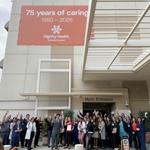Having ramped up services to fulfill the growing community needs during the pandemic, officials with San Mateo-based Samaritan House, say the region’s nonprofits will need sustained support while pursuing a long-term pandemic recovery.
“Organizations like Samaritan House are going to need financial donations and we’re going to need volunteers just as we always have just in greater numbers,” Bart Charlow, CEO of Samaritan House, said. “We know that a basic safety net needs to be here for quite some time into the future so that our communities can thrive.”
Since the start of the pandemic last March, Samaritan House and many other nonprofits have had to quickly expand services while modifying for COVID-19 safety guidelines. Requests for food services from Samaritan House doubled from before the pandemic.
Need for rental assistance typically totaled around $2 million in previous years, but as the organization became responsible for handling funds through various local programs, it distributed more than $10 million in 2020 alone. Shelter capacity has also doubled and requests for clothing from the agency’s Kids Closet is up by 25%.
To ensure safety, the agency started offering drive-thru food bank services five days a week. And caseworkers also had to pivot, going remote while still connecting those in need with the various programs already in existence and those just being launched.
“It’s very, very hard. Very emotional,” Julio Campos, a Samaritan House case worker of nearly 20 years, said.
In normal times, Campos would work with up to six clients a week, coupling individuals with food, housing, health and other forms of assistance. During the first six months of the pandemic, his caseload leaped to 25 clients a week.
Answering phone calls became difficult, he said. Residents were on the edge of losing their homes, their jobs and their lives. More than a year into the pandemic, Campos said he still worries for the families he serves.
Many have emptied their bank accounts to cover mounting bills. Without steady work, some have begun to consider returning to their country of origin, potentially splitting up a family in search of pay. And of those who have found employment, few have returned to the same level of work available just last January.
“Most of the clients, they don’t know how long the pandemic will continue,” Campos said. “Most don’t have savings. They don’t have food in the house. Many things are difficult for them.”
COVID-19 reality
Rudy Rivera, a 42-year-old father of three, nearly lost his East Palo Alto apartment after spending months out of work. Employed as a mover, jobs dried up by the end of March for both him and his wife Mariza who works as a housekeeper.
The family immigrated to the United States from Guatemala in 2003, in search of industrial work and learned the importance of saving money during the 2008 recession. Rivera said he and his wife worked hard to build up roughly $12,000 of reserves “just in case.”
With their two adult children living independently, Rivera said the funds helped the family of three last through the summer until moving jobs became available a day or two a week starting in August.
Recommended for you
But in December, the parents and their 17-year-old son contracted the virus, forcing the family into isolation and out of work again. The lost pay further devastated the family who once managed to live comfortably on an annual household income of $50,000.
“I feel like I want to cry when I think about that. We were living dollar by dollar and then we got sick,” Rivera said.
Once the family’s quarantine period ended, Rivera’s employers were still apprehensive to welcome the team lead back and removed him from the schedule until the end of January. Without pay and having depleted the family savings trying to survive, Rivera was forced to notify his landlord that he would be a second month behind rent.
The apartment office recommended the family call Samaritan House for assistance and soon, Rivera was in touch with his case manager Angela Hall who helped the family secure the two months rent owed, totaling $3,062.
Now caught up with rent, Rivera shared hope for his family’s financial recovery. Some bills are still behind and rebuilding the family savings will likely take years but work has improved. Rivera said the family is also less embarrassed to ask for help but said he’d rather leave the assistance to those less fortunate.
“If I can work I’m not going to ask for support because I’m pretty sure there are people in need more than I am,” Rivera said. “One day I hope I can give back what I get from them.”
Planning for recovery
While the health crisis appears to be improving, Charlow noted the economic crisis is far from over. Nonprofits fear for the “financial cliff” as residents forget many are still struggling despite the state reopening. The level of federal and state funding is also unsustainable, he said.
But the immense need is unlikely to fall substantially anytime soon, ultimately requiring agencies like his to sustain current levels of support while looking to governing agencies to make access to programs easier.
Still, Charlow landed on optimism. With more than 4,000 volunteers having been onboarded, he said the agency and others have seen an outpouring of community support, which the county will need if all residents are to recover.
“It’s not just free labor. It’s the way people from completely different walks of life with different political views put their hands and their hearts together and help other people,” Charlow said. “By seeing them face to face, person to person, they understand more and bring that out into the community in terms of an understanding of what human need we have all around us.”
(650) 344-5200 ext. 106































(0) comments
Welcome to the discussion.
Log In
Keep the discussion civilized. Absolutely NO personal attacks or insults directed toward writers, nor others who make comments.
Keep it clean. Please avoid obscene, vulgar, lewd, racist or sexually-oriented language.
Don't threaten. Threats of harming another person will not be tolerated.
Be truthful. Don't knowingly lie about anyone or anything.
Be proactive. Use the 'Report' link on each comment to let us know of abusive posts.
PLEASE TURN OFF YOUR CAPS LOCK.
Anyone violating these rules will be issued a warning. After the warning, comment privileges can be revoked.